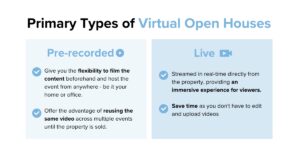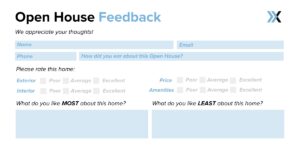Discover the secrets to hosting an exceptional Virtual Open House. Our comprehensive guide will walk you through the process, from platform selection to engaging event strategies and overcoming obstacles.

The world is changing, and so is the way we play the property game. Gone are the days when we’d all gather ’round a house on a sunny Sunday afternoon. Now, we’re bringing the open house experience straight to your screen—and it’s time to level up your game.
With the advent of virtual open houses, real estate agents now have a powerful tool at their disposal, capable of reaching a broader audience and revolutionizing the way properties are marketed. This in-depth article aims to provide real estate agents with a comprehensive understanding of virtual open houses, their advantages, and a step-by-step guide on how to effectively host and leverage this innovative approach to property showcasing.
The traditional open house format has served the industry well for years, but it comes with certain limitations. Not every potential buyer can attend an in-person event due to geographical constraints, time conflicts, or other commitments. Virtual open houses, enabled by video technology, offer real estate agents a myriad of benefits that go beyond merely accommodating remote viewers.
Embracing this innovative approach will not only help agents adapt to the evolving real estate landscape but also empower them to provide a superior level of service to their clients, ultimately leading to increased sales and a thriving real estate practice. In fact, 63% of buyers in 2020 made offers on homes they never saw in person.
So, join us as we explore the fascinating world of virtual open houses and unlock new opportunities for success in the real estate industry.
What is a Virtual Open House?
A virtual open house is similar to an in-person one, but attendees participate through a screen. It involves using a video conferencing tool to do an on-screen walkthrough of the property and answer any questions potential buyers may have.
A virtual open house isn’t just a digital twin of an in-person event. It’s more like a dynamic, interactive experience where attendees join you through a screen. You’ve probably seen this in action with virtual campus tours, which let prospective students chat with current ones and get a feel for campus life before enrolling.
For real estate agents, a virtual open house is a game-changer. Using video conferencing tools or specialized real estate software, you can guide potential buyers through a property as if they were right there with you, answering their questions along the way.
There are two primary types of virtual open houses: pre-recorded and live.
Pre-recorded open houses give you the flexibility to film the content beforehand and host the event from anywhere – be it your home or office.
Live open houses, on the other hand, are streamed in real-time directly from the property, providing an immersive experience for viewers.
Virtual tours are versatile and can be conducted for any property you’re selling. However, they shine particularly bright in specific situations:
1. Long-Distance Love: When you have interested buyers from out of state, virtual open houses offer a convenient way to showcase properties without the need for travel.
2. Online Search Dominance: If your listings are attracting a high volume of online searches, virtual open houses can efficiently cater to this broader audience.
3. Balancing Interests: When multiple potential buyers are interested in the same property, virtual open houses provide an equitable way to accommodate them simultaneously.
4. Homeowner’s Preference: For sellers who prefer to stay in their property or want to minimize foot traffic, virtual open houses offer a discreet and convenient alternative to traditional open houses.
If you are looking to unleash the full potential of your Virtual Open Houses, our video-editing services through our Virtual Assistant Services can help you captivate your audience. We meticulously craft engaging content tailored specifically for your virtual open houses, ensuring increased viewer interest and participation. Visit Xcellence Toolbox and let us elevate your virtual open house experience.

Benefits of Virtual Open Houses
Virtual open houses offer a multitude of benefits that can give you a competitive edge in the real estate game. The most significant advantage? Expanding your reach to a wider, more diverse audience. By embracing this digital trend, you ensure your properties are visible and accessible to a broader range of potential buyers.
Let’s delve into the perks of both live and pre-recorded virtual open houses:
Seller-Friendly Experience
Virtual open houses make life easier for sellers. During live sessions, only the seller and agent need to be physically present, reducing the number of people in the house compared to traditional open houses. Pre-recorded options also allow for flexibility, enabling sellers to record the tour at their convenience and host the event later when it suits potential buyers best.
Cost-Effective and Time-Saving
Virtual open houses cut down on expenses and effort. You won’t need to prepare snacks or print materials like pamphlets, floor plans, or flyers. Additionally, you can accommodate more interested parties without the limitations of in-person open houses, leading to increased efficiency and reduced workload.
Live sessions save time as you don’t have to edit and upload videos, while pre-recorded sessions offer the advantage of reusing the same video across multiple events until the property is sold.
Incorporating virtual open houses into your real estate strategy not only expands your reach but also demonstrates your adaptability and forward-thinking approach in this ever-evolving industry.

Challenges of hosting a Virtual Open House
Addressing these challenges can help improve the virtual open house experience for both real estate agents and potential buyers. Some common challenges faced when hosting virtual open houses include:
1. Variable internet connectivity among buyers: When conducting live sessions, you depend on participants having stable internet connections for clear communication. Pre-recorded content can be more accessible by allowing downloads, but this might not address the need for real-time interaction.
2. Preference for in-person viewings by traditional buyers: Some potential buyers may still prefer seeing properties in person, as they feel virtual tours cannot fully capture the essence of a space. However, live open houses can provide an initial introduction that helps streamline their in-person visits.
3. Inability to conduct virtual open houses asynchronously: Engaging in virtual open houses without real-time interaction can be challenging. While you can upload pre-recorded content to a website, you may miss out on the opportunity to address critical questions and concerns from potential buyers in real time.
How To Host A Virtual Open House
1. Pick the best platform for hosting Virtual Open Houses
Alright, let’s dive into the world of virtual open houses! First things first, you need to find the perfect platform and features that make your online events shine. Some popular choices include video meetings, Facebook Live, and Matterport tours. Matterport tours are like taking a magical 3D journey through a house, where people can explore at their own pace.
Now, if you’re planning a Matterport tour or a live open house, you’ll need a video conferencing platform to make it happen. When you’re choosing your platform, keep an eye out for these awesome features:
- Live Video Calling: You want crystal-clear video calls that make your guests feel like they’re right there in the house. Dialpad is a fantastic option, as it provides top-notch live video quality.
- Recording Your Sessions: Any good platform should let you record your open house. This way, buyers can rewatch it later, and you can review your sessions to see what’s working and what’s not.
- Access on Mobile and Web Browsers: Make sure your open house is easy to access from any device – phones, tablets, or computers. This way, your guests can join in however they like without any extra hassle.
- In-App Messaging: Not everyone has a microphone or feels comfortable using it. So, having a chat feature is super important. It allows your guests to ask questions or chat with each other without interrupting the main event.
2. Advertise your Virtual Open House through social media and email
Alright, now that you’ve got your platform all setup, it’s time to spread the word about your virtual open house! Just like you would for a regular open house, you need to promote it on social media and through email. This way, more people will know about it and join in the fun.
Asking people to RSVP is a great idea because it helps you get an idea of how many people are coming and allows you to send them reminders. You can use push notifications if you have an app, calendar reminders, and even a series of friendly email reminders leading up to the event.
Having people RSVP also makes it easier for you to plan and prepare. You’ll know roughly how many people to expect, so you can make sure everything runs smoothly during the open house.
To effectively promote your virtual open house, consider utilizing our comprehensive Virtual Assistant Services. We can create tailored marketing materials to boost your success. As a Pro-Assist plan member of the Xcellence Family, you can enjoy your first order completely free of charge. Visit your Xcellence Toolbox today and take advantage of this exceptional opportunity.
3. Staging and preparations for the Virtual Open House
Even though it’s an online event, you should still do all the usual staging and preparations as you would for an in-person open house. This will help make the house look its best and attract more potential buyers.
Before the event, make sure your technology is working perfectly, and you have a strong internet connection. It’s also smart to have a backup plan in case something goes wrong during the live show.
Now, let’s talk about the house itself. Clear a pathway through the property, so you can easily move around without any obstacles. No need for furniture hurdles or acrobatics here! This will make your virtual tour smooth and enjoyable for everyone watching.
Properly staging the home is crucial, even for online events. It helps you sell the house faster and for a better price. So, take your time and make sure everything looks amazing for your virtual open house.
4. Do a trial run and get feedback
To ensure a smooth and successful virtual open house, it’s essential to do a trial run and gather feedback from your team. This will help you identify any issues and polish your presentation before the actual event.
Invite your team members to join a practice run, using different devices like computers, browsers, and mobile devices. This will help you ensure that your presentation looks great and functions well across various platforms.
After the trial run, have a meeting with your team to discuss their feedback. Talk about what worked well and what needed improvement. Don’t forget to address any technical issues that arose during the practice run. Also, create a plan for handling potential problems, such as poor internet access in specific areas of the house or showing certain parts of the property again for late attendees.
By doing a trial run and getting constructive feedback, you’ll be better prepared for your virtual open house and can provide a top-notch experience for your viewers.
5. Prepare a list of talking points
To ensure a smooth and engaging virtual open house, prepare a list of talking points for your live stream. This will help you stay organized and give your viewers a clear idea of what to expect during the event. As a result, they’ll be more likely to ask relevant questions at the right time.
To master the art of showcasing your property’s unique features and captivating potential buyers during Virtual Open Houses, don’t miss out on our comprehensive guide. Delve into our exclusive article, “Discover the Power of ChatGPT for Real Estate Listing Descriptions: 5 Effective Tips,” and take your virtual property presentations to the next level.
6. Consider scheduling multiple events
Consider scheduling multiple events to accommodate different time zones and preferences. This way, more potential buyers can attend and participate in the open house. It’s also a good idea to have separate events for virtual and in-person attendees to avoid any distractions or background noise that could disrupt the virtual experience.
To make scheduling easier, you can use the Dialpad Meetings Add-On for Google Calendar. This tool allows you to schedule your events directly from your Google Calendar, ensuring that you never double-book and can plan your meetings around your lifestyle.
7. Consider video quality
As a real estate agent, even though you’re not a professional videographer, it’s crucial to think about camera angles and lighting for your virtual open houses. Invest in a high-quality camera that can capture every corner of the property, including smaller spaces like bathrooms and closets. Additionally, consider using supplementary lighting to illuminate dimly lit rooms and showcase the property’s dimensions accurately.
Discuss with your team the best filming locations and essential angles to highlight the property’s features. Your trial run will help you fine-tune these aspects and ensure the property is presented at its best.
Consider using 360-degree views, like Matterport, to provide buyers with a comprehensive perspective of the property. Whether you’re hosting a Livestream or a pre-recorded event, sharing this feature can significantly enhance your viewers’ understanding of the property.
8. Answer concerns
During the virtual open house, give viewers ample time to explore the space and ask questions. Avoid rushing through the property, as this can make the experience less engaging. Encourage participants to ask questions as you move from room to room.
Address concerns and provide additional details as you tour the property. Check-in with potential buyers throughout the open house to ensure they have all the information they need. This approach saves time and prevents the need for excessive backtracking.
9. Follow-up
After hosting a virtual open house, create a checklist to ensure a smooth follow-up process and maintain communication with potential buyers.
- Offer an opt-in for future listings: Give attendees the option to receive updates on upcoming properties during the event registration, and reiterate this choice in a follow-up email.
- Send thank-you notes: Express gratitude to attendees for their time and interest in the property by sending a personalized email after the virtual open house, along with your contact information for further questions.
- Request feedback and reviews: Improve your virtual open house experience by asking attendees for their feedback and reviews. Share surveys and invite them to leave comments on your website and social media accounts. Don’t forget to include a section for general feedback on the property itself.
- Strong call-to-action: In your post-event communication, encourage interested buyers to make an offer on the property, provide clear next steps, and outline the timeline. Also, engage those who haven’t shown interest in this property by inviting them to subscribe for updates on your other listings.

The world of real estate is rapidly evolving, and virtual open houses have emerged as a powerful tool for real estate agents. They provide a convenient, cost-effective, and time-saving approach to showcasing properties, expanding reach, and catering to diverse audiences.
By following the steps outlined in this article, real estate agents can successfully host virtual open houses, engage with potential buyers, and ultimately thrive in the dynamic real estate industry. Embrace the future of property showcasing and unlock new opportunities for success with virtual open houses.
